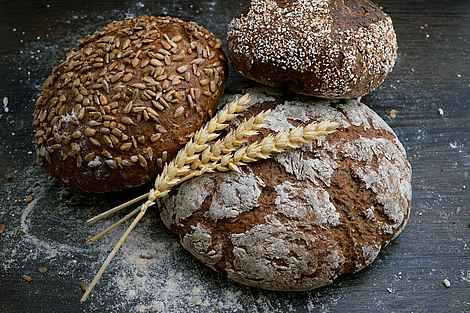Growth and differentiation form the plant. Here, growth means that organic mass is built up through cell division and elongation [1]. The basis for this vegetative process is photosynthesis, for which the plants require sufficient light, moisture, warmth and carbon dioxide. Living soil with its soil organisms and various nutrients such as minerals is also part of this. Growth can be understood as a kind of expansive filling of space, in which not just mass but also higher-molecular carbohydrates such as starch and fibre are formed. In differentiation, however, the plants become more refined. This can be seen wherever form, fragrance, flavour or colour occur. Chlorophyll is broken down in the leaves and carbohydrates are broken down in the fruit, while secondary plant substances such as flavonoids and phenols are built up at the same time. Fruits lose their firmness, become soft and develop their characteristic flavour – they become edible. The edibility of fruit can be understood as a sign of completed ripening. It is an interplay of growth and differentiation processes that constitute ripening and which are necessary in equal measure [1].
At certain times of the year or with certain plants, there are shifts in the balance of these processes, such as with lettuce for example, where the leaves are eaten and not the fruit. It is therefore more growth-orientated. Such vegetables are not referred to as "ripe", but as "ready to harvest". At this point, growth and differentiation have come to an end and the lettuce is ready for the next step, the harvest.
The colour, fragrance and flavour substances, in other words secondary plant substances, are not only important for the plant to form its own identity and to ward off pests, but also play a decisive role in the enjoyment of the food and in human health. The formation of secondary plant substances is individual to each plant and is strongly influenced by the cultivation method: in one study, for example, the effect of biodynamic preparations on the growth and pulp quality of pumpkins was investigated [2]. On the one hand, the application of horn manure and horn silica influenced plant growth, which was reflected, for example, in a higher dry matter content of the skin and pulp. On the other hand, the content of total carotenoids and antioxidants was significantly higher compared to pumpkins that did not receive any preparations.
In another study, the constituents of blackcurrants from organic and conventional cultivation were compared [3]. Here too, a higher content of secondary plant substances such as the polyphenol quercetin or the anthocyanin cyanidin was found in organically grown blackcurrants. If the conditions are such that the plants can develop in a balanced way, they can form their characteristic secondary plant substances. If, on the other hand, growth is accelerated by synthetic fertilisers, flowering and seed formation will suffer. The differentiation phase does not take place, so that the formation of quality characteristics such as aroma and colour is inadequate.
In biodynamic agriculture in particular, the healthy ripening of plants is encouraged by the application of preparations and the use of light and warmth. This enables healthy foods to be produced. They are refined in artisanal further processing and a characteristic flavour develops. In bread baking, it has long been known that the ripening process is a central point in flavour development [4]. The digestibility is also significantly better if the dough has enough time to break down and convert certain proteins and carbohydrates. If we want to compare it to the ripening of plants, bread has a kind of growth phase and a ripening phase during production, which allows flavour, aroma and digestibility to develop [4]. Both phases are important and – like the ripening of the plant – contribute significantly to quality.
Ripeness reveals its own character, which, for example, brings us pleasure through flavour development and stimulates us. This is the case with plants as well as processed foods such as bread and cheese. We can recognise ripeness and quality in food if we take the time to be perceptive for sensory impressions and experiences of enjoyment. In this way, we also learn to develop an increasing differentiation in how we sense these things. Eating slowly and consciously also has a positive effect on digestion, which makes food more palatable and easier to digest. Mindful eating can even be seen as a kind of ripening in this sense.
Other points in life are also about ripening and maturity: readiness for school, sexual maturity, university entrance – these are all points in time when something comes to an end, such as a child's carefree playtime, and something new begins, such as the school years. Once we are fully grown, we can only mature, which is initially understood physiologically as ageing. However, it means more than just getting wrinkles and grey hair: it means developing mental maturity and increasingly developing our own individuality, expressing it and specialising. This also takes time, and a healthy environment too contributes to healthy development – just as the plants show us.
Bibliography
[1] Bloksma J (2021): “Groß, grün und knackig ist vital – stimmt das?” in Peschke J Vom Acker auf den Teller – was Lebensmittel wirklich gesund macht, AT Verlag, (99-109)
[2] Juknevičienė E, Danilčenko H, Jarienė E, Živatkauskienė V, Zeise J, Fritz J (2021): “The Effect of Biodynamic Preparations on Growth and Fruit Quality of Giant Pumpkins (Cucurbita Maxima)”, Chemical and Biological Technologies in Agriculture, 8(60). https://doi.org/10.1186/s40538-021-00258-z
[3] Rachtan-Janicka J, Ponder A, Hallmann E (2021): “The Effect of Organic and Conventional Cultivations on Antioxidants Content in Blackcurrant (Ribes nigrum L.) Species”, Applied Sciences, 11(11):5116. https://doi.org/10.3390/app11115113
[4] Kunz P (2021): “Wachsen und Reifen sind ein Paar” in Peschke J Vom Acker auf den Teller – was Lebensmittel wirklich gesund macht, AT Verlag, (111-117)
